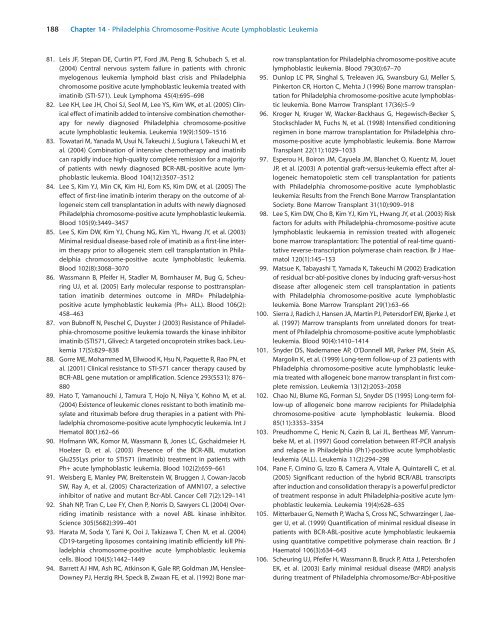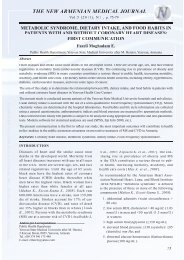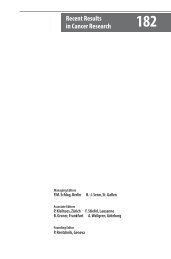Acute Leukemias - Republican Scientific Medical Library
Acute Leukemias - Republican Scientific Medical Library
Acute Leukemias - Republican Scientific Medical Library
Create successful ePaper yourself
Turn your PDF publications into a flip-book with our unique Google optimized e-Paper software.
188 Chapter 14 · Philadelphia Chromosome-Positive <strong>Acute</strong> Lymphoblastic Leukemia<br />
81. Leis JF, Stepan DE, Curtin PT, Ford JM, Peng B, Schubach S, et al.<br />
(2004) Central nervous system failure in patients with chronic<br />
myelogenous leukemia lymphoid blast crisis and Philadelphia<br />
chromosome positive acute lymphoblastic leukemia treated with<br />
imatinib (STI-571). Leuk Lymphoma 45(4):695–698<br />
82. Lee KH, Lee JH, Choi SJ, Seol M, Lee YS, Kim WK, et al. (2005) Clinical<br />
effect of imatinib added to intensive combination chemotherapy<br />
for newly diagnosed Philadelphia chromosome-positive<br />
acute lymphoblastic leukemia. Leukemia 19(9):1509–1516<br />
83. Towatari M, Yanada M, Usui N, Takeuchi J, Sugiura I, Takeuchi M, et<br />
al. (2004) Combination of intensive chemotherapy and imatinib<br />
can rapidly induce high-quality complete remission for a majority<br />
of patients with newly diagnosed BCR-ABL-positive acute lymphoblastic<br />
leukemia. Blood 104(12):3507–3512<br />
84. Lee S, Kim YJ, Min CK, Kim HJ, Eom KS, Kim DW, et al. (2005) The<br />
effect of first-line imatinib interim therapy on the outcome of allogeneic<br />
stem cell transplantation in adults with newly diagnosed<br />
Philadelphia chromosome-positive acute lymphoblastic leukemia.<br />
Blood 105(9):3449–3457<br />
85. Lee S, Kim DW, Kim YJ, Chung NG, Kim YL, Hwang JY, et al. (2003)<br />
Minimal residual disease-based role of imatinib as a first-line interim<br />
therapy prior to allogeneic stem cell transplantation in Philadelphia<br />
chromosome-positive acute lymphoblastic leukemia.<br />
Blood 102(8):3068–3070<br />
86. Wassmann B, Pfeifer H, Stadler M, Bornhauser M, Bug G, Scheuring<br />
UJ, et al. (2005) Early molecular response to posttransplantation<br />
imatinib determines outcome in MRD+ Philadelphiapositive<br />
acute lymphoblastic leukemia (Ph+ ALL). Blood 106(2):<br />
458–463<br />
87. von Bubnoff N, Peschel C, Duyster J (2003) Resistance of Philadelphia-chromosome<br />
positive leukemia towards the kinase inhibitor<br />
imatinib (STI571, Glivec): A targeted oncoprotein strikes back. Leukemia<br />
17(5):829–838<br />
88. Gorre ME, Mohammed M, Ellwood K, Hsu N, Paquette R, Rao PN, et<br />
al. (2001) Clinical resistance to STI-571 cancer therapy caused by<br />
BCR-ABL gene mutation or amplification. Science 293(5531): 876–<br />
880<br />
89. Hato T, Yamanouchi J, Tamura T, Hojo N, Niiya Y, Kohno M, et al.<br />
(2004) Existence of leukemic clones resistant to both imatinib mesylate<br />
and rituximab before drug therapies in a patient with Philadelphia<br />
chromosome-positive acute lymphocytic leukemia. Int J<br />
Hematol 80(1):62–66<br />
90. Hofmann WK, Komor M, Wassmann B, Jones LC, Gschaidmeier H,<br />
Hoelzer D, et al. (2003) Presence of the BCR-ABL mutation<br />
Glu255Lys prior to STI571 (imatinib) treatment in patients with<br />
Ph+ acute lymphoblastic leukemia. Blood 102(2):659–661<br />
91. Weisberg E, Manley PW, Breitenstein W, Bruggen J, Cowan-Jacob<br />
SW, Ray A, et al. (2005) Characterization of AMN107, a selective<br />
inhibitor of native and mutant Bcr-Abl. Cancer Cell 7(2):129–141<br />
92. Shah NP, Tran C, Lee FY, Chen P, Norris D, Sawyers CL (2004) Overriding<br />
imatinib resistance with a novel ABL kinase inhibitor.<br />
Science 305(5682):399–401<br />
93. Harata M, Soda Y, Tani K, Ooi J, Takizawa T, Chen M, et al. (2004)<br />
CD19-targeting liposomes containing imatinib efficiently kill Philadelphia<br />
chromosome-positive acute lymphoblastic leukemia<br />
cells. Blood 104(5):1442–1449<br />
94. Barrett AJ HM, Ash RC, Atkinson K, Gale RP, Goldman JM, Henslee-<br />
Downey PJ, Herzig RH, Speck B, Zwaan FE, et al. (1992) Bone mar-<br />
row transplantation for Philadelphia chromosome-positive acute<br />
lymphoblastic leukemia. Blood 79(30):67–70<br />
95. Dunlop LC PR, Singhal S, Treleaven JG, Swansbury GJ, Meller S,<br />
Pinkerton CR, Horton C, Mehta J (1996) Bone marrow transplantation<br />
for Philadelphia chromosome-positive acute lymphoblastic<br />
leukemia. Bone Marrow Transplant 17(36):5–9<br />
96. Kroger N, Kruger W, Wacker-Backhaus G, Hegewisch-Becker S,<br />
Stockschlader M, Fuchs N, et al. (1998) Intensified conditioning<br />
regimen in bone marrow transplantation for Philadelphia chromosome-positive<br />
acute lymphoblastic leukemia. Bone Marrow<br />
Transplant 22(11):1029–1033<br />
97. Esperou H, Boiron JM, Cayuela JM, Blanchet O, Kuentz M, Jouet<br />
JP, et al. (2003) A potential graft-versus-leukemia effect after allogeneic<br />
hematopoietic stem cell transplantation for patients<br />
with Philadelphia chromosome-positive acute lymphoblastic<br />
leukemia: Results from the French Bone Marrow Transplantation<br />
Society. Bone Marrow Transplant 31(10):909–918<br />
98. Lee S, Kim DW, Cho B, Kim YJ, Kim YL, Hwang JY, et al. (2003) Risk<br />
factors for adults with Philadelphia-chromosome-positive acute<br />
lymphoblastic leukaemia in remission treated with allogeneic<br />
bone marrow transplantation: The potential of real-time quantitative<br />
reverse-transcription polymerase chain reaction. Br J Haematol<br />
120(1):145–153<br />
99. Matsue K, Tabayashi T, Yamada K, Takeuchi M (2002) Eradication<br />
of residual bcr-abl-positive clones by inducing graft-versus-host<br />
disease after allogeneic stem cell transplantation in patients<br />
with Philadelphia chromosome-positive acute lymphoblastic<br />
leukemia. Bone Marrow Transplant 29(1):63–66<br />
100. Sierra J, Radich J, Hansen JA, Martin PJ, Petersdorf EW, Bjerke J, et<br />
al. (1997) Marrow transplants from unrelated donors for treatment<br />
of Philadelphia chromosome-positive acute lymphoblastic<br />
leukemia. Blood 90(4):1410–1414<br />
101. Snyder DS, Nademanee AP, O‘Donnell MR, Parker PM, Stein AS,<br />
Margolin K, et al. (1999) Long-term follow-up of 23 patients with<br />
Philadelphia chromosome-positive acute lymphoblastic leukemia<br />
treated with allogeneic bone marrow transplant in first complete<br />
remission. Leukemia 13(12):2053–2058<br />
102. Chao NJ, Blume KG, Forman SJ, Snyder DS (1995) Long-term follow-up<br />
of allogeneic bone marrow recipients for Philadelphia<br />
chromosome-positive acute lymphoblastic leukemia. Blood<br />
85(11):3353–3354<br />
103. Preudhomme C, Henic N, Cazin B, Lai JL, Bertheas MF, Vanrumbeke<br />
M, et al. (1997) Good correlation between RT-PCR analysis<br />
and relapse in Philadelphia (Ph1)-positive acute lymphoblastic<br />
leukemia (ALL). Leukemia 11(2):294–298<br />
104. Pane F, Cimino G, Izzo B, Camera A, Vitale A, Quintarelli C, et al.<br />
(2005) Significant reduction of the hybrid BCR/ABL transcripts<br />
after induction and consolidation therapy is a powerful predictor<br />
of treatment response in adult Philadelphia-positive acute lymphoblastic<br />
leukemia. Leukemia 19(4):628–635<br />
105. Mitterbauer G, Nemeth P, Wacha S, Cross NC, Schwarzinger I, Jaeger<br />
U, et al. (1999) Quantification of minimal residual disease in<br />
patients with BCR-ABL-positive acute lymphoblastic leukaemia<br />
using quantitative competitive polymerase chain reaction. Br J<br />
Haematol 106(3):634–643<br />
106. Scheuring UJ, Pfeifer H, Wassmann B, Bruck P, Atta J, Petershofen<br />
EK, et al. (2003) Early minimal residual disease (MRD) analysis<br />
during treatment of Philadelphia chromosome/Bcr-Abl-positive
















